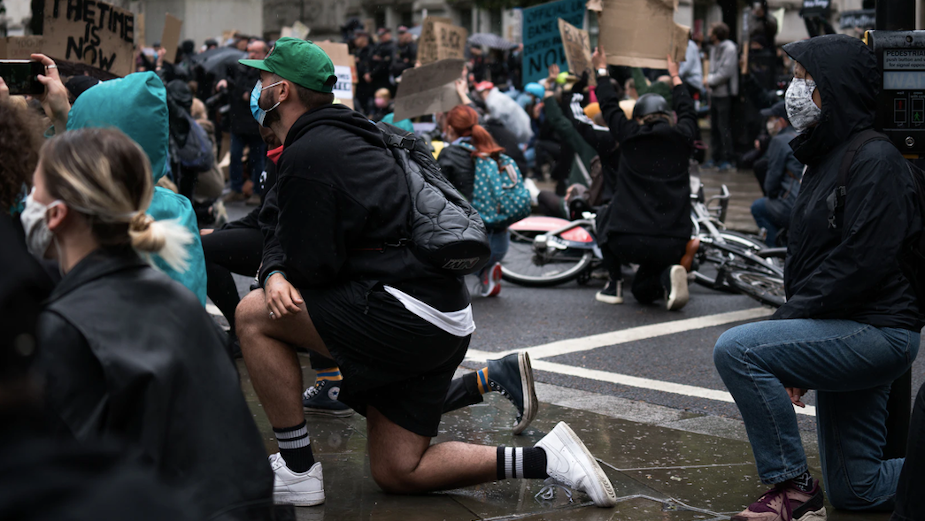
'For the Industry to Tackle Racism, We Need to Start Seeing it'

AKQA London Strategist Rosie Cross explores how we must interrogate our actions more deeply in order to tackle racism in our industry.
Over the last fortnight, brands and agencies have been grappling with the right way to talk about racism - in ways that don’t seem opportunistic or profit-motivated. Many brands have pledged support of the Black community in statements that condemn police brutality. But though well-meaning, these statements conveniently distance us from the problem. Somehow, despite being predominantly white, it hasn’t been widely recognised until now that racism plagues our industry.
That might seem like too strong a statement - which is understandable. A huge barrier to white people recognising the role we play in racism is that we pretty much define ‘racism’ as hate crimes and discrimination. We learnt that racism is the KKK, physical and verbal abuse, and segregation. We know that racism is bad. We’ve never knowingly harmed a Black person, so we condemn those evil racists who have, and feel glad that we’re not part of the problem.
But racism runs deeper than that, in systemic, and subtle ways. Often injustice in society or in the workplace is so normalised, many of us white people don’t even realise it’s there. And as we don’t define ourselves as ‘racist’, we find it very hard to reconcile that anything we’re doing might be wrong.
For example, is your workforce almost all white, without that seeming unfair? Do you think that afros are an ‘unprofessional’ hairstyle? Is racism considered an ‘inappropriate’ topic of conversation for your workplace? Does it seem normal that Black people hold only the lower paid jobs in your company? Do you hire through your employees’ existing social contacts? Do you hire through ‘meritocracy’ without realising that, as you are a person, what you think is ‘of merit’ is actually subjective - incorporating stereotypes and biases you might unconsciously have? Innocuous as these examples might seem, they are all corporate norms that better serve white people, whilst exacerbating society’s racial inequalities.
To take the example of ‘appropriate’ hair: afro hair is not a choice of style, in the way a white person would choose to wear pigtails. Afro hair is just Black people’s natural hair, so to discriminate against it is deeper than a style preference. With hair discrimination laws still legal in most US states, it is very real that many Black people are required to deny a part of their racial identity for employment opportunities. Ogilvy’s ‘Change the stats, not the fro’ campaign highlighted that a mere 37% of women feel comfortable wearing their hair naturally to a professional event, and last year a Dove study found Black women are 80% more likely to change their natural hair to meet social expectations in the office. Expecting Black people to make their hair flatter and straighter for work is to uphold white people’s hair as the professional norm. The message implied is that being too Black isn’t ‘appropriate’ for work.
Similarly, avoiding the topic of racism at work isn’t too much of an issue for white people. It’s a conversation that requires uncomfortable self-reflection, and we might feel nicer about ourselves if we leave it alone. As we aren’t harmed by racism every day, it’s not personal to us, and we’re free to dip in and out of the topic at will. But that’s not the same for Black people. Shutting down conversations about racism at work denies Black people their voice to object if they are experiencing discrimination.
I highly doubt anyone has malicious intentions here. You might have thought these things were harmless, or you might’ve never even noticed them. But just because you haven’t experienced something, it doesn’t mean it doesn’t exist.
We (white people) feel uncomfortable when someone suggests we did something racist, because we’re not anything like the racists we learnt about at school. But we all grew up in a world that benefits white people, so let's be real - we’re likely to have absorbed a lot of the stereotypes and assumptions about society that led us here. Read up on it! Try to see differently. And try not to feel defensive when thinking about yourself and racism.
To build a fairer industry, we need to stop thinking racism is only violence, and start recognising our own role in the problem. I have no doubt that racial discrimination, in some form, will have impacted your company. Expanding our definition of racism will help us feel a lot more comfortable tackling it.
Start learning: Why I'm No Longer Talking To White People About Race by Reni Eddo-Lodge, White Fragility by Robin DiAngelo, Me and White Supremacy by Layla Saad, among others. Please take the time to listen to Black people's experiences if they want to share, but don't expect them to educate you where we can educate ourselves; experiences can be painful to relive.













